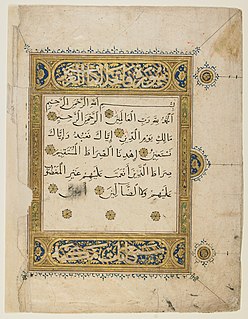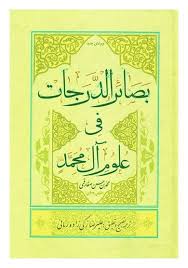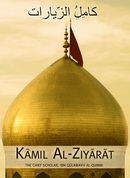Related Research Articles

Abū Zakariyyā Yaḥyā ibn Sharaf al-Nawawī, popularly known as al-Nawawī or Imam Nawawī, was a Sunni Shafi'ite jurist and hadith scholar. He authored numerous and lengthy works ranging from hadith, to theology, biography, and jurisprudence. Al-Nawawi never married.

Muhammad al-Baqir full name Muhammad bin 'Ali bin al-Husayn bin Ali bin Abi Talib, also known as Abu Ja'far or simply al-Baqir (677-733) was the fifth Imam in Shia Islam, succeeding his father Zayn al-Abidin and succeeded by his son Ja'far al-Sadiq. His mother, Fatima Umm Abdallah, was the daughter of Hasan ibn Ali, making him the first Imam descended from both grandsons of Muhammad: Hasan ibn Ali and Husayn ibn Ali. in Naqshbandi order, he is revered as the father of Ja'far al-Sadiq, the sheikh of the Golden Chain.

Al-Fatiha, alternatively transliterated Al-Fātiḥa or Al-Fātiḥah is the first surah (chapter) of the Quran. It consists of 6 or 7 āyāt (verses) which are a prayer for guidance and mercy. Al-Fatiha is recited in Muslim obligatory and voluntary prayers, known as salah.

The Elephant is the 105th chapter (surah) of the Quran. It is a Meccan sura consisting of 5 verses. The surah is written in the interrogative form.

Ahl al-Bayt primarily refers to the family of the Islamic prophet Muhammad, and, to a lesser extent, his ancestor and the Islamic prophet Ibrahim (Abraham).
The hadith of the twelve successors, or twelve caliphs is an Islamic prophecy, attributed to Muhammad. It is most popular among Twelver Shi'ites, as they interpret the prophecy was fulfilled by the Twelve Imams. The hadith is widely accepted by all Muslims, but its interpretation varies heavily.
The Verse of Light is the 35th verse of the 24th surah of the Quran (Q24:35). The verse is renowned for its remarkable beauty and imagery, and perhaps more than any other verse lends itself to mystical or esoteric readings of the Quran.

The Shia view of the Qur'an differs from the Sunni view, but the majority of both groups believe that the text is identical. While some Shia disputed the canonical validity of the Uthmanic codex, the Shia Imams always rejected the idea of alteration of Qur'an's text. Only seven Shia scholars have believed in omissions in the Uthmanic codex.
Tafsir Ishraq al-Ma’ani is a commentary on the Qur'an (tafsir) in the English language by Indian Islamic scholar Syed Iqbal Zaheer, who was an editor of the Bangalore-based weekly Islamic magazine Young Muslim Digest.
Makhzan al-Irfan fi Tafsir al-Quran is a 15 volume tafsir by the Twelver Shia Islamic scholar and the only mujtahida of 20th century Banu Amin.
Abu al-Hasan Ali Ibn Ibrāhim al-Qummi was a 10th century Shi'a commentator and jurist of Persian origin. He lived during the time of the eleventh Shi'a Imam Hasan al-Askari. Many traditions in the famous book Al-Kafi were transmitted by him. Ibrāhim’s patronymic was “Abu al-Hasan” but he was also known as “al-Shaykh al-Aqdam”. He was the first to promulgate the “Kufan” traditions (Hadiths) in Qom and collected Hadith from many scholars. He wrote more than 15 books, famously his commentary Tafsir al-Qummi. He is said to have been one of the most important Twelver Imami Quran commentators. His other works include Akhbār Al-Qurʾan, Nawadir al-Qurʾan, al-Nasikh wa al-Mansukh, al-Sharā'i' , and al-Tawhid wa al-Shirk. He died in 919 A.D.
Tafsir Furat Kufi is an exegesis of the Quran by Furat Ibn Furat Ibn Ibrahim al-Kufi and is one of the oldest Shia Quranic commentaries. It is the most famous book of the author and is a commentary based upon traditions (Hadith). The traditions used by this book are mainly narrated either from Muhammad al-Baqir, Jafar al-Sadiq or Ali's disciples such as `Abd Allah ibn `Abbas, Mujahid and Asbagh Ibn Nubata; although there are some that relate to one of the companions of Muhammad. Tafsir Furat Kufi is similar to Tafsir Ayyashi and Tafsir Qomi in that it is selective in offering commentary on Quranic verses. Unlike the two mentioned Tafsirs however, Tafsir Furat Kufi has a Shia Islam outlook and focuses only on verses that include Shia allusions. Tafsir Furat Kufi can be titled an Imami exegesis in all aspects. It has been cited extensively by many Shia scholars of later generations. For example, in his introduction to Bihar al-Anwar, Majlisi counts Tafsir Furat Kufi among the most important sources for his composition. Many old manuscripts of Tafsir Furat Kufi are found in Iran and Iraq.
Tafsir Imam Ja'far al-Sadiq refers to a collection of hadiths reportedly narrated by Ja'far al-Sadiq that comment on the verses of the Qur'an. The approach of these narratives is generally mystical. Initially, they were recited at Sufi circles in Kufa and Baghdad. The first person to have reported this collection is one of Sufi scholars Abu Abd al-Rahman Sulami as part of his Haqaiq al-Tafsir. While Sulami provides parts of the hadiths, Sufi scholar Khargushi provides some other in his Arais al-Bayan fi Haqaiq al-Quran Ruzbihan Baqli.

Baṣāʾir ad-Darajāt fi ʿUlūm ʾĀle Muḥammad wa-mā khaṣṣahumu--Allāh, alternatively known as Baṣaʾir ad-Darajāt al-Kubrā fī Faḍāʾil ʾĀle Muḥammad, is a Hadith compilation considered to be one of the oldest books in Hadith among Shias. The book's author is Abū Jaʿfar Muḥammad ibn al-Hasan ibn Farrūkh al-ʾAʿraj, popularly known as Sheikh aṣ-Ṣaffār al-Qummī

Kamil al-Ziyarat is a Hadith collection of 843 traditions, by the famous Twelver Shia Hadith scholar Abul-Gasem Jafar b. Mohammad b. Jafar b. Musab Qulawayh Qumi Bagdadi, commonly known as Ibn Qulawayh.
Khasf al-Bayda, in Islamic eschatology, is an upcoming event in which the Earth will swallow the land Bayda which is a desert between Mecca and Medina. According to Islamic traditions: the army of Sufyani will be collapsed in the land of Bayda.
Mohammad ibn Masoud Ayyashi or Mohammad ibn Masoud Ayyashi Samarqandi, known as Ayyashi, was an eminent Shia Islam scholar. He had many works in the field of exegesis of the Quran, Islamic jurisprudence, Arabic literature and hadith. His exegesis of the Quran, known as Tafsir Ayyashi, is his most famous book.